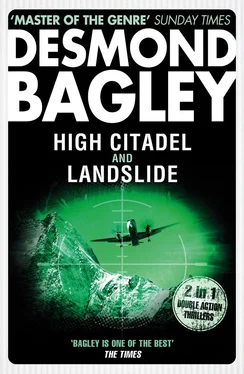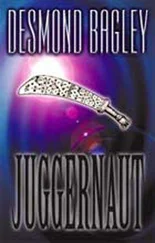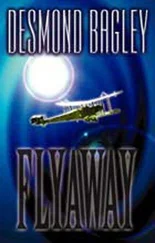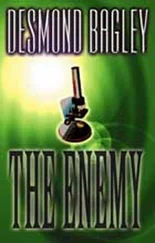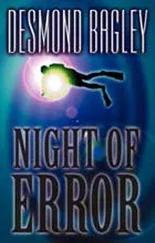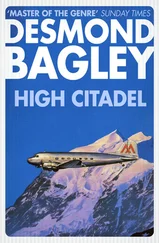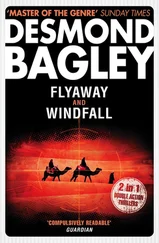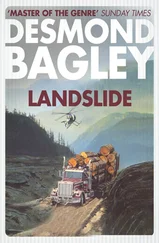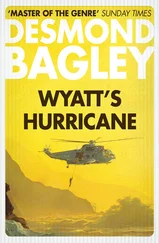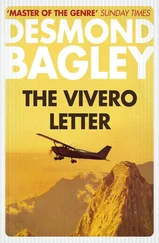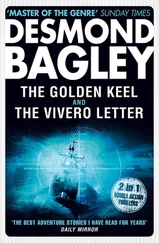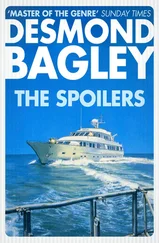‘You said something strange,’ said Benedetta. ‘You said that Korea wasn’t too bad – the fighting part of it. What was bad, if it wasn’t the fighting?’
O’Hara looked into the distance. ‘It was when the fighting stopped – when I stopped fighting – when I couldn’t fight any more. Then it was bad.’
‘You were a prisoner? In the hands of the Chinese? Forester said something of that.’
O’Hara said slowly, ‘I’ve killed men in combat – in hot blood – and I’ll probably do it again, and soon, at that. But what those communist bastards can do intellectually and with cold purpose is beyond …’ He shook his head irritably. ‘I prefer not to talk about it.’
He had a sudden vision of the bland, expressionless features of the Chinese lieutenant, Feng. It was something that had haunted his dreams and woken him screaming ever since Korea. It was the reason he preferred to go to sleep in a sodden, dreamless and mindless coma. He said, ‘Let’s talk about you. You speak good English – where did you learn it?’
She was aware that she had trodden on forbidden and shaky ground. ‘I’m sorry if I disturbed you, Señor O’Hara,’ she said contritely.
‘That’s all right. But less of the Señor O’Hara; my name is Tim.’
She smiled quickly. ‘I was educated in the United States, Tim. My uncle sent me there after Lopez made the revolution.’ She laughed. ‘I was taught English by a teacher very like Miss Ponsky.’
‘Now there’s a game old trout,’ said O’Hara. ‘Your uncle sent you? What about your parents?’
‘My mother died when I was a child. My father – Lopez had him shot.’
O’Hara sighed. ‘We both seem to be scraping on raw nerves, Benedetta. I’m sorry.’
She said sadly, ‘It’s the way the world is, Tim.’
He agreed sombrely. ‘Anyone who expects fair play in this world is a damn fool. That’s why we’re in this jam. Come on, let’s get back; this isn’t getting us anywhere.’ He pinched off his cigarette and carefully put the stub back in the packet.
As Benedetta rose she said, ‘Do you think that Señor Armstrong’s idea of a crossbow will work?’
‘I don’t,’ said O’Hara flatly. ‘I think that Armstrong is a romantic. He’s specialized as a theoretician in wars a thousand years gone, and I can’t think of anything more futile than that. He’s an ivory-tower man – an academician – bloodthirsty in a theoretical way, but the sight of blood will turn his stomach. And I think he’s a little bit nuts.’
Armstrong’s pipe gurgled as he watched Willis rooting about in the rubbish of the workshop. His heart was beating rapidly and he felt breathless, although the altitude did not seem to affect him as much as the previous time he had been at the hutted camp. His mind was turning over the minutiae of his profession – the science of killing without gunpowder. He thought coldly and clearly about the ranges, trajectories and penetrations that could be obtained from pieces of bent steel and twisted gut, and he sought to adapt the ingenious mechanisms so clearly diagrammed in his mind to the materials and needs of the moment. He looked up at the roof beams of the hut and a new idea dawned on him. But he put it aside – the crossbow came first.
Willis straightened, holding a flat spring. ‘This came from an auto – will it do for the bow?’
Armstrong tried to flex it and found it very stiff. ‘It’s very strong,’ he said. ‘Probably stronger than anything they had in the Middle Ages. This will be a very powerful weapon. Perhaps this is too strong – we must be able to bend it.’
‘Let’s go over that problem again,’ Willis said.
Armstrong drew on the back of an envelope. ‘For the light sporting bows they had a goat’s-foot lever, but that is not strong enough for the weapon we are considering. For the heavier military bows they had two methods of bending – the cranequin, a ratchet arranged like this, which was demounted for firing, and the other was a windlass built into the bow which worked a series of pulleys.’
Willis looked at the rough sketches and nodded. ‘The windlass is our best bet,’ he said. ‘That ratchet thing would be difficult to make. And if necessary we can weaken the spring by grinding it down.’ He looked around. ‘Where’s Peabody?’
‘I don’t know,’ said Armstrong. ‘Let’s get on with this.’
‘You’d better find him,’ Willis said. ‘We’ll put him on to making arrows – that should be an easy job.’
‘Bolts or quarrels,’ said Armstrong patiently.
‘Whatever they’re called, let’s get on with it,’ Willis said.
They found Peabody taking it easy in one of the huts, heating a can of beans. Reluctantly he went along to the workshop and they got to work. Armstrong marvelled at the dexterity of Willis’s fingers as he contrived effective parts from impossible materials and worse tools. They found the old grindstone to be their most efficient cutting tool, although it tended to waste material. Armstrong sweated in turning the crank and could not keep it up for long, so they took it in turns, he and Willis silently, Peabody with much cursing.
They ripped out electric wiring from a hut and tore down conduit tubing. They cut up reinforcing steel into lengths and slotted the ends to take flights. It was cold and their hands were numb and the blood oozed from the cuts made when their makeshift tools slipped.
They worked all night and dawn was brightening the sky as Armstrong took the completed weapon in his hands and looked at it dubiously. ‘It’s a bit different from how I imagined it, but I think it will do.’ He rubbed his eyes wearily. I’ll take it down now – they might need it.’
Willis slumped against the side of the hut. ‘I’ve got an idea for a better one,’ he said. ‘That thing will be a bastard to cock. But I must get some sleep first – and food.’ His voice trailed to a mumble and he blinked his eyes rapidly.
All that night the bridge had been illuminated by the headlamps of the enemy vehicles and it was obviously hopeless to make a sortie in an attempt to cut the cables. The enemy did not work on the bridge at night, not relishing being in a spotlight when a shot could come out of the darkness.
Forester was contemptuous of them. ‘The goddam fools,’ he said. ‘If we can’t hit them in daylight then it’s sure we can’t at night – but if they’d any sense they’d see that they could spot our shooting at night and they’d send a man on to the bridge to draw our fire – then they’d fill our man full of holes.’
But during the daylight hours the enemy had worked on the bridge, and had been less frightened of the shots fired at them. No one had been hit and it had become obvious that there was little danger other than that from a freakishly lucky shot. By morning there were but six bullets left for Rohde’s pistol and there were nine more planks in the bridge.
By nine o’clock Rohde had expended two more bullets and it was then that Armstrong stumbled down the road carrying a contraption. ‘Here it is,’ he said. ‘Here’s your crossbow.’ He rubbed his eyes which were red-rimmed and tired. ‘Professionally speaking, I’d call it an arbalest.’
‘My God, that was quick,’ said O’Hara.
‘We worked all night,’ Armstrong said tiredly. ‘We thought you’d need it in a hurry.’
‘How does it work?’ asked O’Hara, eyeing it curiously.
‘The metal loop on the business end is a stirrup,’ said Armstrong. ‘You put it on the ground and put your foot in it. Then you take this cord and clip the hook on to the bowstring and start winding on this handle. That draws back the bowstring until it engages on this sear. You drop a bolt in this trough and you’re ready to shoot. Press the trigger and the sear drops to release the bowstring.’
Читать дальше
